
Jake Harding (He/Him) MAUA MSci PGCE
Student Enrichment Manager
Whilst I am currently the Student Enrichment Manager for the Faculty of Science and Engineering and an active member of the Rainbow Network Staff Forum, I thought that I should start my story way back when I first arrived at university as a Natural Sciences student myself. I had always understood my sexuality to be ‘not 100% straight and not 100% gay’ since before they had us formally practising delicately placing condoms on bananas at school…
As a scientist by nature, I cannot resist an opportunity to express a concept as a percentage and I often use that straight/gay percentage split that has fluidly shifted throughout my life (and continues to do so to this day) as a mechanism to effectively describe the lived experience of my bisexuality to others who ask. However, it was not until after I arrived at university that I felt safe enough to ‘come out’ to my family for fear of reprisals whilst still dependently living at home. Unfortunately, I believe that this experience is not exclusive to myself as a member of the Bs in the A to Z of the queer community, although I admittedly do not spend as much time as I would like learning about my own community and so visibility periods such as this represent an opportunity for me to do just that.*
Whilst all perspectives are unique, the top two interconnected things that I am asked about my own bisexuality centre around bi-erasure and biphobia:
Bi-erasure is “the act of belittling, demeaning or obscuring the existence of bisexual people”* and I have personally experienced this both in terms of relationships and even in academia. For example, when I have openly been in a relationship with a person who identifies as female then it is almost always assumed that I am straight, and similarly if male, then gay. Sadly, I must admit that sometimes I have not initially challenged this assumption so as not to upset the assumers’ feelings and by so doing sometimes feel that I am ‘letting the side down’. In academia, such as when debating the sexuality of a famous historical figure, the debate almost always centres around either straight or gay. This affected me most when studying English Literature at sixth form, where the sexuality that I identified most with was never even considered.
Biphobia is “a prejudice against bisexual people”* and I have personally experienced this both from within and outside of the queer community. For example, within the community, I have been accused before of ‘letting the side down’ by passing as straight and not challenging that assumption being interpreted as homophobia by disassociation. Outside of the community, I have been accused before of being either ‘greedy’ or opposingly in ‘denial’ about my own sexuality.
Putting aside for the moment the emotionally eroding effects of all the above compounded on myself and my colleagues, now imagine the effects on the developing belief and value systems of our students. Remember, they may have had the misfortune of experiencing similar.
Finally, my hope is that you have found this short reflection engaging, educational and a celebration of what I believe the HE sector has achieved so far on the EDI front as the safe space that I spoke of at the beginning. I also hope that this has shone a light on the context of where some members of our community, staff and students, may have come from, as well as humbly offering up some food for thought as to how we may all show our support as allies and celebrate our diversity as an inclusive university community. I believe that the sector should be proud of what has been achieved and so galvanised to continue to fly the flag ever higher. Thank you for taking the time to read this article.
* As an aside, I can certainly recommend ‘From Ace to Ze, The Little Book of LGBT Terms by Harriet Dyer’ as an easy reading starting point.
